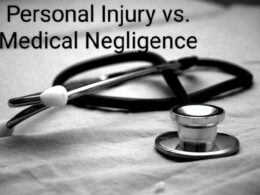If you have lost a loved one due to medical negligence, you may be wondering how much compensation you can receive. Compensation for wrongful death due to medical negligence can vary widely, depending on the circumstances of the case. While it is impossible to give a precise figure, there are several factors that can affect the amount of compensation you may be able to receive.
In today’s piece, we will extensively discuss how much compensation can you claim for death by medical negligence.
Medical Negligence
When you or a loved one seeks medical treatment, you expect to receive competent care. Unfortunately, medical negligence can occur, leading to serious injuries or even death. Understanding medical negligence is crucial to protecting your rights as a patient.
What is Medical Negligence?
Medical negligence occurs when a healthcare professional fails to provide the standard of care that a reasonable healthcare professional would provide in similar circumstances. In other words, medical negligence is a breach of the duty of care owed by a healthcare professional to a patient.
Medical negligence can take many forms, including misdiagnosis, failure to diagnose, surgical errors, and more. Medical negligence can also occur through omissions, such as failing to order necessary tests or failing to refer a patient to a specialist.
Elements of a Medical Negligence Claim
To prove medical negligence, you must establish four elements:
- The healthcare professional owed you a duty of care.
- The healthcare professional breached that duty of care.
- The breach of duty caused your injuries.
- You suffered damages as a result of the breach of duty.
To establish these elements, you will need to provide evidence, including medical records, expert witness testimony, and more. Proving medical negligence can be complex, so it is essential to work with an experienced medical malpractice attorney.
Standard of Care
The standard of care is the level of care that a reasonable healthcare professional would provide in similar circumstances. To prove medical negligence, you must show that the healthcare professional breached the standard of care.
Causation
Causation refers to the link between the healthcare professional’s breach of duty and your injuries. To prove causation, you must show that the breach of duty caused your injuries.
Informed Consent
Informed consent refers to the process by which a patient is informed of the risks and benefits of a medical procedure or treatment. If a healthcare professional fails to obtain informed consent, it may be considered medical negligence.
Expert Witnesses
Expert witnesses are often used in medical negligence cases to provide testimony regarding the standard of care and whether the healthcare professional breached that standard of care.
Res Ipsa Loquitor
Res ipsa loquitor is a legal doctrine that allows a plaintiff to establish a breach of duty without proving exactly how the healthcare professional breached that duty. Res ipsa loquitor may apply in cases where the injury would not have occurred but for the healthcare professional’s negligence.
Conclusion
Understanding medical negligence is essential to protecting your rights as a patient. If you believe that you or a loved one has been the victim of medical negligence, it is important to seek legal advice from an experienced medical malpractice attorney.
Compensation for Death by Medical Negligence
If you have lost a loved one due to medical negligence, you may be entitled to compensation. While no amount of money can bring your loved one back, compensation can help ease the financial burden that comes with such a loss.
What is Considered a Wrongful Death?
A death is considered wrongful if it is caused by the negligence, recklessness, or intentional act of another. In the case of medical negligence, this can include a failure to diagnose or treat a medical condition, surgical errors, medication errors, or other forms of medical malpractice.
Economic and Non-Economic Damages
Compensation for wrongful death can include both economic and non-economic damages. Economic damages are those that can be quantified, such as medical bills, funeral expenses, and lost income. Non-economic damages are more subjective and can include things like emotional distress, loss of consortium, and loss of companionship.
Punitive Damages
In some cases, punitive damages may also be awarded. These are intended to punish the responsible party for their actions and to deter others from engaging in similar behavior.
Statute of Limitations
It is important to note that there is a statute of limitations for filing a wrongful death claim. This varies by state, but in general, you have a limited amount of time to file a claim after the death of your loved one.
Claim Process
The claim process for wrongful death can be complex and time-consuming. It is important to work with an experienced attorney who can guide you through the process and help you get the compensation you deserve. Your attorney will work with you to gather evidence, negotiate with insurance companies, and represent you in court if necessary.
As the executor of your loved one’s estate, you have the right to file a wrongful death claim on behalf of your loved one’s dependents. With the help of an attorney, you can seek compensatory and punitive damages to cover financial losses and hold the responsible party accountable for their actions.
Overall, compensation for death by medical negligence can help ease the financial burden that comes with such a loss. While no amount of money can bring your loved one back, it can provide some measure of justice and closure.
Medical Negligence Cases and Liability
If you have lost a loved one due to medical negligence, you may be entitled to compensation. Medical negligence cases can be complex, and liability can fall on various entities. In this section, we will discuss medical professionals and hospitals, private hospitals vs. NHS, and expert solicitors and lawyers.
Medical Professionals and Hospitals
Medical professionals, including doctors, nurses, and other healthcare professionals, have a duty of care to their patients. If they fail to provide an acceptable standard of care, they may be held liable for medical negligence. Hospitals can also be held liable for the actions of their employees.
Medical errors can occur due to a variety of reasons, including misdiagnosis, medication errors, and mistakes during surgery. If you believe that medical negligence was a factor in your loved one’s death, you should speak to a medical malpractice attorney.
Private Hospitals vs. NHS
If your loved one was treated in a private hospital, the hospital may be liable for medical negligence. Private hospitals are held to the same standards of care as NHS hospitals. However, private hospitals may have different policies and procedures in place, which can affect liability.
If your loved one was treated in an NHS hospital, you may still be able to make a compensation claim. The NHS has a duty of care to its patients, and if this duty is breached, they may be held liable for medical negligence.
Expert Solicitors and Lawyers
If you are considering making a compensation claim for medical negligence, it is essential to seek the advice of an expert solicitor or lawyer. Medical negligence cases can be complex, and it is crucial to have someone on your side who understands the legal process.
Expert solicitors and lawyers can help you navigate the legal system and ensure that you receive the compensation you are entitled to. They can also provide guidance on the evidence you will need to support your claim.
In conclusion, medical negligence cases can be complicated, and liability can fall on various entities. If you believe that medical negligence was a factor in your loved one’s death, you should speak to a medical malpractice attorney. They can help you understand your legal options and guide you through the compensation claim process.
Conclusion
To simply answer the question: how much compensation can you claim for death by medical negligence? Know that one of the most important factors in determining compensation for wrongful death due to medical negligence is the severity of the negligence. If the negligence was particularly egregious, you may be able to receive a larger settlement.
Other factors that can affect the amount of compensation include the age and health of the deceased, the number of dependents left behind, and the amount of income the deceased would have earned over the course of their lifetime.
It is important to note that compensation for wrongful death due to medical negligence is not intended to replace your loved one, but rather to help you cope with the financial and emotional burden of their loss.
YOU SHOULD ALSO READ:












